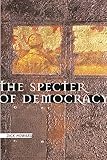The Specter of Democracy : What Marx and Marxists Haven't Understood and Why / Dick Howard.
Material type: TextPublisher: New York, NY : Columbia University Press, [2006]Copyright date: ©2006Description: 1 online resource (368 p.)Content type:
TextPublisher: New York, NY : Columbia University Press, [2006]Copyright date: ©2006Description: 1 online resource (368 p.)Content type: - 9780231124843
- 9780231505222
- 321.8
- JC423 .H7536 2002
- online - DeGruyter
- Issued also in print.
| Item type | Current library | Call number | URL | Status | Notes | Barcode | |
|---|---|---|---|---|---|---|---|
 eBook
eBook
|
Biblioteca "Angelicum" Pont. Univ. S.Tommaso d'Aquino Nuvola online | online - DeGruyter (Browse shelf(Opens below)) | Online access | Not for loan (Accesso limitato) | Accesso per gli utenti autorizzati / Access for authorized users | (dgr)9780231505222 |
Frontmatter -- Contents -- Introduction: Why Should We, and How Should We, Reclaim Marx? -- Part 1. Marxism and the Intellectuals -- 1.Marxism in the Postcommunist orWld -- 2.Can French Intellectuals Escape Marxism -- 3.The Frankfurt School and the Transformation of Critical Theory into Cultural Theory -- 4.Habermas' s Reorientation of Critical Theory Toward Democratic Theory -- 5.The Anticommunist Marxism of Socialisme ou Barbarie -- 6.Claude Lefort's Passage from Revolutionary Theory to Political Theory -- 7.From Marx to Castoriadis, and from Castoriadis -- 8.From the Critique of Totalitarianism to the Politics of Democracy -- Part 2. Republican Democracy or Democratic Republics -- 9.The Burden of French History -- 10.Intersecting Trajectories of Republicanism in France and the United States -- 11. Reading U.S. History as Political -- 12.Fundamentalism and the American Exception -- Part 3. Back to Marx? -- 13.Philosophy by Other Means -- Notes -- Index
restricted access online access with authorization star
http://purl.org/coar/access_right/c_16ec
In this rethinking of Marxism and its blind spots, Dick Howard argues that the collapse of European communism in 1989 should not be identified with a victory for capitalism and makes possible a wholesale reevaluation of democratic politics in the U.S. and abroad. The author turns to the American and French Revolutions to uncover what was truly "revolutionary" about those events, arguing that two distinct styles of democratic life emerged, the implications of which were misinterpreted in light of the rise of communism.Howard uses a critical rereading of Marx as a theorist of democracy to offer his audience a new way to think about this political ideal. He argues that it is democracy, rather than Marxism, that is radical and revolutionary, and that Marx could have seen this but did not. In Part I, Howard explores the attraction Marxism held for intellectuals, particularly French intellectuals, and he demonstrates how the critique of totalitarianism from a Marxist viewpoint allowed these intellectuals to see the radical nature of democracy. Part II examines two hundred years of democratic political life-comparing America's experience as a democracy to that of France. Part III offers a rethinking of Marx's contribution to democratic politics. Howard concludes that Marx was attempting a "philosophy by other means," and that paradoxically, just because he was such an astute philosopher, Marx was unable to see the radical political implications of his own analyses. The philosophically justified "revolution" turns out to be the basis of an anti-politics whose end was foreshadowed by the fall of European communism in 1989.
Issued also in print.
Mode of access: Internet via World Wide Web.
In English.
Description based on online resource; title from PDF title page (publisher's Web site, viewed 02. Mrz 2022)


